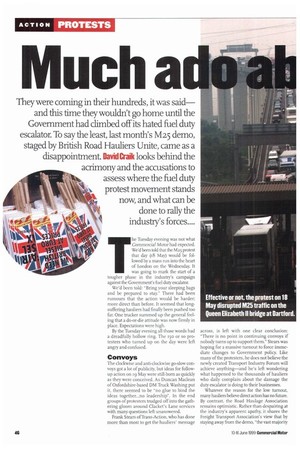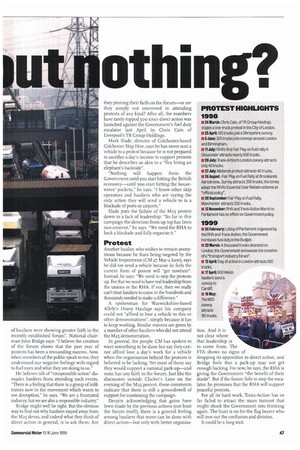They were coming in their hundreds, it was said— and
Page 48

Page 49

If you've noticed an error in this article please click here to report it so we can fix it.
this time they wouldn't go home until the Government had climbed off its hated fuel duty escalator. To say the least, last month's M25 demo, staged by British Road Hauliers Unite, came as a disappointment. David Craik looks behind the acrimony and the accusations to assess where the fuel duty protest movement stands now, and what can be done to rally the industry's forces....
he Tuesday evening was not what Commercial Motor had expected. We'd been told that the M25 protest that day (i8 May) would be followed by a mass run into the heart of London on the Wednesday. It was going to mark the start of a tougher phase in the industry's campaign against the Government's fuel duty escalator.
We'd been told: "Bring your sleeping bags and be prepared to stay." There had been rumours that the action would be harder: more direct than before. It seemed that longsuffering hauliers had finally been pushed too far. One trucker summed up the general feeling that a do-or-die attitude was now firmly in place. Expectations were high.
By the Tuesday evening all those words had a dreadfully hollow ring. The 15o or so protesters who turned up on the day were left angry and confused.
Convoys
The clockwise and anti-clockwise go-slow convoys got a lot of publicity, but ideas for followup action on 19 May were still-born as quickly as they were conceived. As Duncan Maclean of Oxfordshire-based DM Truck Washing put it, there seemed to be no glue to bind the ideas together...no leadership". In the end groups of protesters trudged off into the gathering gloom around Clacket's Lane services with many questions left unanswered.
Frank Stears of Trans-Action, who has done more than most to get the hauliers' message across, is left with one clear conclusion: "There is no point in continuing convoys if nobody turns up to support them." Stears was hoping for a massive turnout to force immediate changes to Government policy. Like many of the protesters, he does not believe the newly created Transport Industry Forum will achieve anything—and he's left wondering what happened to the thousands of hauliers who daily complain about the damage the duty escalator is doing to their businesses.
Whatever the reason for the low turnout, many hauliers believe direct action has no future. By contrast, the Road Haulage Association remains optimistic. Rather than despairing at the industry's apparent apathy, it shares the Freight Transport Association's view that by staying away from the demo, "the vast majority of hauliers were showing greater faith in the recently established forum". National chairman John Bridge says: "I believe the creation of the forum shows that the past year of protests has been a resounding success. Now, when members of the public speak to me, they understand our negative feelings with regard to fuel rates and what they are doing to us."
He believes talk of "irresponsible action" dissuades hauliers from attending such events. "There is a feeling that there is a group of infiltrators now in the movement which wants to see disruption," he says. "We are a frustrated industry, but we are also a responsible industry."
Bridge might well be right. But the obvious way to find out why hauliers stayed away from the M25 demo, and indeed what they think of direct action in general, is to ask them. Are they pinning their faith on the forum—or are they simply not interested in attending protests of any kind? After all, the numbers have rarely topped 5oo since direct action was launched against the Government's fuel duty escalator last April by Chris Cain of Liverpool's TR Group Holdings.
Mark Slade, director of Colchester-based Colchester Skip Hire, says he has never sent a vehicle to a protest because he is not prepared to sacrifice a day's income to support protests that he describes as akin to a "flea biting an elephant's backside".
"Nothing will happen from the Government until you start hitting the British economy—until you start hitting the housewives' pockets," he says. "I know other skip operators and hauliers who are saying the only action they will send a vehicle to is a blockade of ports or airports."
Slade puts the failure of the M25 protest down to a lack of leadership: "So far in this campaign the direction from up top has been non-existent," he says. "We need the RHA to back a blockade and fully organise it."
Protest
Another haulier, who wishes to remain anonymous because he fears being targeted by the Vehicle Inspectorate (CM 27 May-2 June), says he did not send a vehicle because he feels the current form of protest will "get nowhere". Instead, he says: "We need to step the protests up. For that we need to have real leadership from the unions or the RHA. If not, then we really can't trust hauliers to come in the hundreds and thousands needed to make a difference."
A spokesman for Warwickshire-based Allely's Heavy Haulage says his company could not "afford to lose a vehicle to this or other demonstrations", simply because it has to keep working. Similar reasons are given by a number of other hauliers who did not attend the M25 demonstration.
In general, the people CM has spoken to want something to be done but say they cannot afford lose a day's work for a vehicle when the organisation behind the protests is believed to be lacking. Yet most of them say they would support a national park-up—and none has any faith in the forum. Just like the discussion outside Clacket's Lane on the evening of the M25 protest, these comments indicate that there is still a groundswell of support for continuing the campaign.
Despite acknowledging that gains have been made by the previous actions (not least the forum itself), there is a general feeling among hauliers that more can be done with direct action—but only with better organisa
tion. And it is not clear where that leadership is to come from. The FTA shows no signs of dropping its opposition to direct action, and Bridge feels that a park-up may not get enough backing. for now, he says, the RHA is giving the Government "the benefit of their doubt". But if the forum fails to stop the escalator, he promises that the RHA will support peaceful protests.
For all its hard work, Trans-Action has so far failed to attract the mass turnout that might shock the Government into thinking again. The hunt is on for the flag bearer who will iron out the confusion and division.
It could be a long wait.
PROTEST HIGHLIGHTS 1998
• 24 March: Chris Cain, of TR Group Holdings stages a one-truck protest in the City of London. IN 25 Apr11:120 trucks join a Shropshire convoy.
• 8 June: 300 trucks join convoys around London and Birmingham.
• 11July: RI-IA's first Fair Play on Fuel rally in Gloucester attracts nearly 500 trucks.
• 20 July: Trans-Action's London convoy attracts only 40 trucks. M 2741ily: Midlands protest attracts 40 trucks.
• 24 August : Fair Play on Fuel Rally at Brooklands Aerodrome, Surrey attracts 200 trucks; the tories adopt the RHA's Essentral User Rebate scheme as "official policy".
• 26 September: Fair Play on Fuel Rally Manchester attracts 250 trucks.
• 13 November: RHA and Trans-Action March to Parliament has no effect on Government policy.
1999
• 24 February: Lobby of Parliament organised by the RHA and Trans-Action; the Government increases fuel duty in the Budget.
• 22 March: A thousand trucks descend on London; the Government announces the creation of a "transport industry forum".
• 12 AprIl: Day of action in London attracts 500 trucks.
• 17 AprIl: 500 Welsh hauliers send a convoy to Cardiff.
• 18 May: The M25 convoy attracts 180 trucks.












































































































